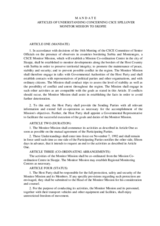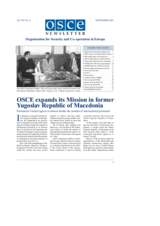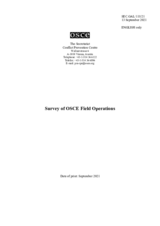About us

The Mission to Skopje supports North Macedonia’s reform efforts, contributing to strong institutions, a modern legislative framework, equality, participation and trust among all communities, in line with North Macedonia’s strategic objectives and OSCE commitments.

Overview
In line with its mandate, the Mission assists North Macedonia in advancing its reform agenda towards a just, equitable and cohesive society and supports the full implementation of the 2001 Ohrid Framework Agreement—a core element of the Mission’s mandate and the cornerstone of the country’s stability, inclusion and social cohesion. Through its work, the Mission strengthens good governance and effective and independent justice systems that uphold the rule of law, inclusion, integrity, security and sustainable development, consistent with the country’s strategic priorities, international standards and OSCE principles.
In view of the Ohrid Framework Agreement and its key pillars—anti-discrimination, decentralization, equitable representation, the rights of smaller communities, education and the use of languages—the Mission works with institutions and civil society to advance reforms and build capacity in areas where the OSCE offers unique added value, drawing on its long-standing presence in the country, in-depth local expertise, and access to the specialized assistance of OSCE institutions.
Its activities focus on five thematic priority areas:
- Criminal justice and police reform: strengthening accountability, professionalism and efficiency in law enforcement and judicial proceedings
- Democratic governance, rule of law and integrity: promoting transparency, accountability and anti-corruption practices across institutions and supporting media freedom and pluralism as essential components of open and accountable governance
- Social cohesion and human rights: protecting fundamental freedoms, promoting equitable participation and fostering inter-community dialogue
- Gender equality: advancing women’s participation and preventing and combating gender-based and domestic violence
- Youth engagement: empowering young people as agents of positive change and civic participation
The Mission works closely with national and local authorities, international partners, political representatives, civil society, religious leaders and law enforcement institutions to ensure its assistance remains relevant, inclusive and effective.
Figures
The Mission's offices, staff and budget at a glance
Offices
1 Headquarters office and 1 field office
The Mission has its headquarters in the capital Skopje, with a field office in Tetovo and an office at the Police Training Centre at Idrizovo.
Staff
137 FIXED-TERM STAFF
The Presence has 28 international and 109 local fixed-term staff (as of 31 December 2024). These figures include staff financed from extrabudgetary contributions.
Budget
€6,506,100
In 2024, the Presence operated on the basis of a Provisional Expenditure Authorization based on its 2021 Unified Budget, which amounted to €6,506,100. The extrabudgetary actual expenditure for 2024 was €1,803,412.
Leadership
Head of the OSCE Mission to Skopje
History and mandate
Established in 1992 by the CSCECSCE
Conference on Security and Co-operation in Europe Committee of Senior Officials
The Spillover Monitoring Mission to Skopje began operations on 7 November 1992 in the context of the conflict in the former Yugoslavia. The Mission’s early mandate was to monitor developments in the border area with Serbia and other areas, to promote respect for territorial integrity and the maintenance of peace, stability and security, and to help prevent a possible conflict in the region. For almost a decade, the Mission operated under its original mandate.
The Mission to Skopje is the OSCE’s longest-serving field mission, established on 7 November 1992.
In 2001, during a seven-month conflict in the country, the strength of the Mission grew steadily to monitor security incidents, report on ceasefire violations, and to provide humanitarian assistance within its mandate. After the hostilities were ended with the signing of the internationally brokered Ohrid Framework Agreement (OFA) on 13 August 2001, the OSCE Mission took on an enhanced mandate.
In addition to the responsibilities outlined under the original mandate, the Mission was tasked with assisting the authorities with a range of confidence building measures to support the implementation of the Ohrid Framework Agreement. including assisting the country to:
- integrate and professionalize the police;
- ensure increasingly equitable representation of non-majority communities in public administration and public enterprises;
- strengthen the institutions of local self-government;
- provide assistance and implement projects in the area of rule of law, particularly to support members of non-majority communities to increase their representation in the judicial system; and
- improve inter-ethnic relations, including in the field of education.
In December 2010, the Permanent Council changed the Mission’s name to the OSCE Mission to Skopje. Today, the Mission’s mandate encompasses three key points: support for further implementation of the Ohrid Framework Agreement, advancing constructive inter-ethnic relations, and monitoring and providing early warning on security-related developments.
Resources
Official OSCE documents and publications from the Mission to Skopje

















